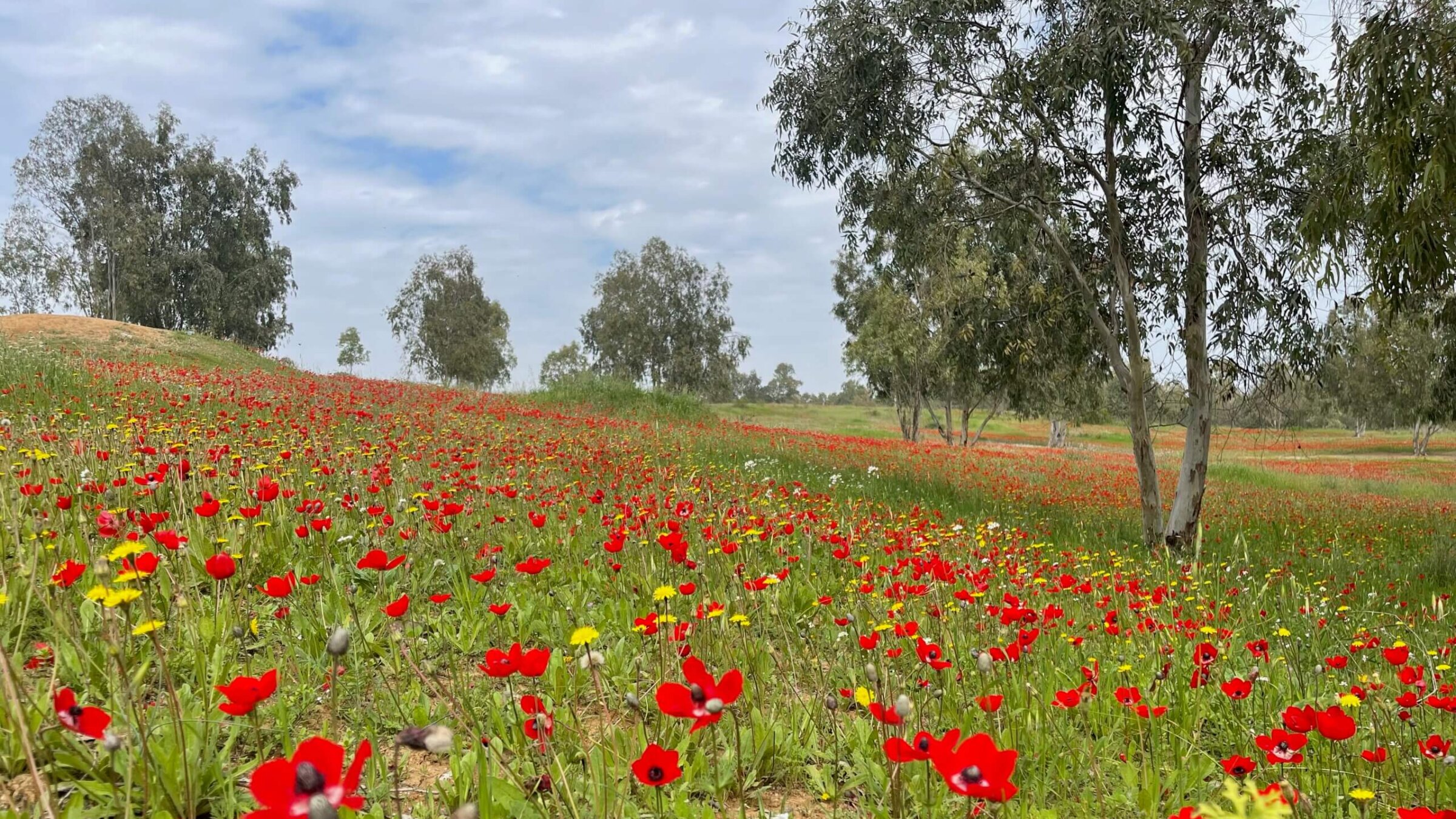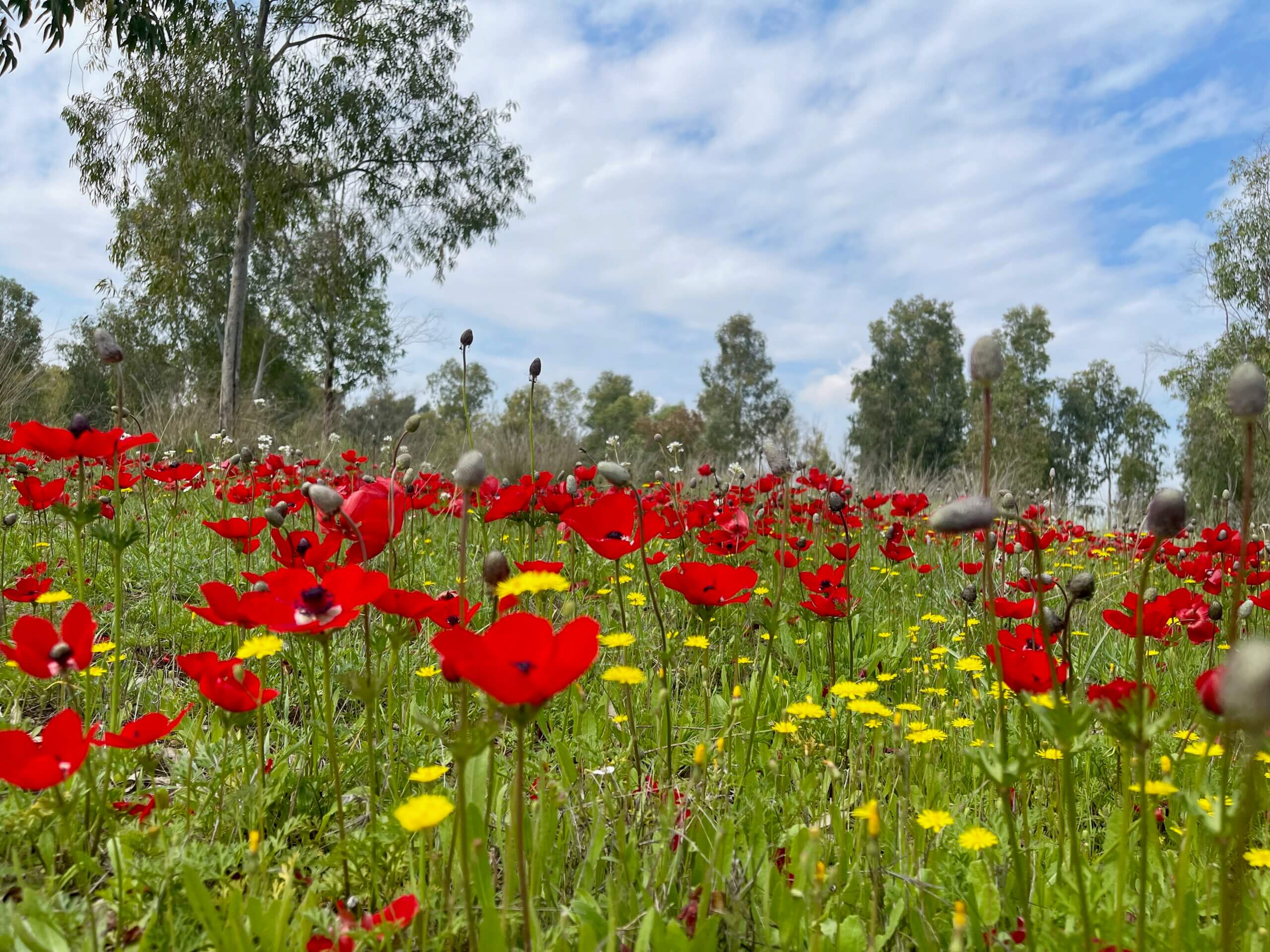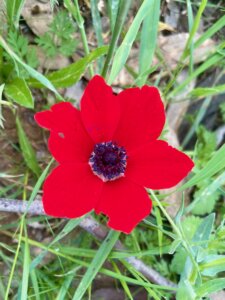Wartime wildflowers draw few visitors: ‘Now all their red makes me think of is blood’
Israelis flock to makeshift memorials for those killed at the Nova music festival instead

The wild buttercups that bloom each year around Israel’s border with Gaza are drawing fewer visitors than the sites where the Oct. 7 massacres took place down the road. Photo by Susan Greene
SHOKEDA FOREST, Israel – Scarlet wildflowers are blanketing these hills just east of the Gaza Strip like red carpets. They are Anemone coronaria— kalanit in Hebrew — Israel’s national flower. They look like poppies, but are actually buttercups; perky in structure, fiery in hue, but short-lived, with blooms lasting only a few days.
Since 2007, a festival called Darom Adom (“Red South”) has drawn hundreds of thousands to these fields to celebrate the flowers’ fleeting beauty. Ofir Libstein, who co-founded the festival with his wife, was killed Oct. 7 while defending their kibbutz, Kfar Aza.
Most Darom Adom hikes, bike races and poetry readings have been canceled this year because of the war raging a few miles away, but Liv Chen, an artist, drove down from Jerusalem anyway last weekend to see the blossoms.
“These flowers, they are a ritual in my family,” she told me. “Now all their red makes me think of is blood.”
Indeed, expressions of grief seem to have surpassed nature appreciation in a nation still reeling from the Oct. 7 attack in which Hamas killed 1,200 people, kidnapped 240 and injured nearly 5,000 in the very areas around where the flowers grow. Soldiers stationed here told me that only a few cars have stopped at the trailheads to the wildflower fields these last few weeks, while the parking lot down the road, at the site of the Nova music festival massacre, has been packed.

Itzik Yaffe, who lives in Tel Aviv, said he had been trying for weeks to convince his wife, Zipi, to make the road trip here to see the buttercups, as they have done every winter for decades.
“She kept telling me not yet, not yet, it’s too soon, it’s too dangerous, let’s go next weekend, the weekend after,” he said.
When he finally persuaded her to make the hour-and-a-half drive south on Saturday, they ended up spending more time at the makeshift memorials to the 360 people shot, bludgeoned or burned to death at the Nova festival.
“It’s more important than flowers,” she said.
The Yaffes, who are in their 70s, were among hundreds of Israelis who roamed the Nova site in Be’eri Forest, where photos of each victim stood in one area and a cluster of paperwhite daffodils planted for each bloomed in another. Dozens packed into the roadside concrete-block bomb shelters nearby where attendees of the music festival hid until Hamas gunmen peppered them with bullets and grenades.
“Wait, mom, wait,” said one young woman who stopped to take a selfie outside one of the bomb shelters. But then three ear-piercing booms from nearby Israeli soldiers firing artillery shells into Gaza sent the two running to take cover in their car.

Gav Dafna, who is 13 and was visiting the Nova site with his family from a town about 25 miles north, told me such shelling is as “normal for us” as the wildflowers.
“Maybe you need to come from someplace else to notice,” he said.
I headed from the Nova memorial to hike the forest’s flower-studded trails. The 14 days of rain in late January and early February that deepened the humanitarian crisis for some half a million displaced people living in leaky tents and lean-tos in Gaza had also made these fields erupt in color.
An IDF Jeep pulled up as I walked. Out came three uniformed army mechanics with camping chairs, which they unfolded in a field awash with buttercups and dandelions as they waited for their next call to repair one of the trucks used to evacuate wounded soldiers. One of them, 39-year-old reservist Amir Sela, made coffee with cardamom over a camp stove, and offered me a slice of dulce de leche cake a civilian had baked for his unit.
Sela told me he knows he has it relatively easy.
Easy in that he has spent the war on this side of the border while comrades risk their lives fighting on the other.
Easy also, he acknowledged, compared to the Palestinians in Gaza he had heard screaming near the border the day before.
And easy, he added, kicking back with his buddies amid the wildflowers, because he is on what he considers “the more beautiful side of this war.”















